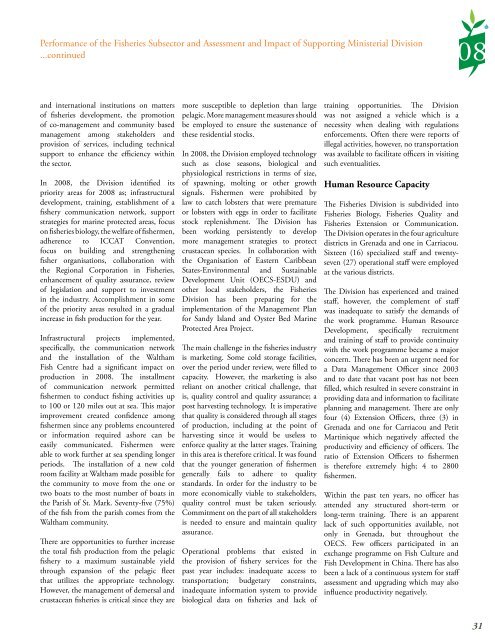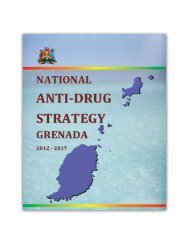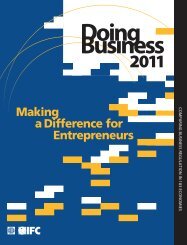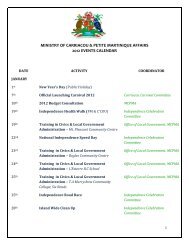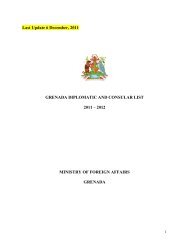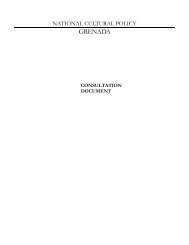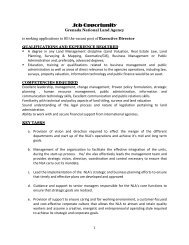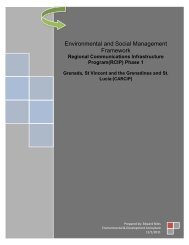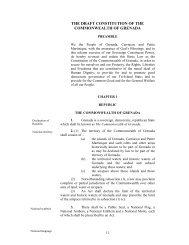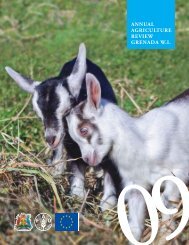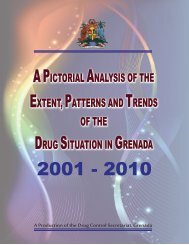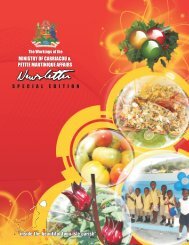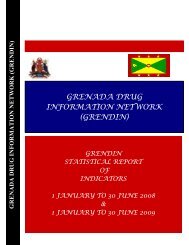Annual Agriculture Review 2008 - Government of Grenada
Annual Agriculture Review 2008 - Government of Grenada
Annual Agriculture Review 2008 - Government of Grenada
You also want an ePaper? Increase the reach of your titles
YUMPU automatically turns print PDFs into web optimized ePapers that Google loves.
Performance <strong>of</strong> the Fisheries Subsector and Assessment and Impact <strong>of</strong> Supporting Ministerial Division<br />
...continued<br />
and international institutions on matters<br />
<strong>of</strong> fisheries development, the promotion<br />
<strong>of</strong> co-management and community based<br />
management among stakeholders and<br />
provision <strong>of</strong> services, including technical<br />
support to enhance the efficiency within<br />
the sector.<br />
In <strong>2008</strong>, the Division identified its<br />
priority areas for <strong>2008</strong> as; infrastructural<br />
development, training, establishment <strong>of</strong> a<br />
fishery communication network, support<br />
strategies for marine protected areas, focus<br />
on fisheries biology, the welfare <strong>of</strong> fishermen,<br />
adherence to ICCAT Convention,<br />
focus on building and strengthening<br />
fisher organisations, collaboration with<br />
the Regional Corporation in Fisheries,<br />
enhancement <strong>of</strong> quality assurance, review<br />
<strong>of</strong> legislation and support to investment<br />
in the industry. Accomplishment in some<br />
<strong>of</strong> the priority areas resulted in a gradual<br />
increase in fish production for the year.<br />
Infrastructural projects implemented,<br />
specifically, the communication network<br />
and the installation <strong>of</strong> the Waltham<br />
Fish Centre had a significant impact on<br />
production in <strong>2008</strong>. The installment<br />
<strong>of</strong> communication network permitted<br />
fishermen to conduct fishing activities up<br />
to 100 or 120 miles out at sea. This major<br />
improvement created confidence among<br />
fishermen since any problems encountered<br />
or information required ashore can be<br />
easily communicated. Fishermen were<br />
able to work further at sea spending longer<br />
periods. The installation <strong>of</strong> a new cold<br />
room facility at Waltham made possible for<br />
the community to move from the one or<br />
two boats to the most number <strong>of</strong> boats in<br />
the Parish <strong>of</strong> St. Mark. Seventy-five (75%)<br />
<strong>of</strong> the fish from the parish comes from the<br />
Waltham community.<br />
There are opportunities to further increase<br />
the total fish production from the pelagic<br />
fishery to a maximum sustainable yield<br />
through expansion <strong>of</strong> the pelagic fleet<br />
that utilizes the appropriate technology.<br />
However, the management <strong>of</strong> demersal and<br />
crustacean fisheries is critical since they are<br />
more susceptible to depletion than large<br />
pelagic. More management measures should<br />
be employed to ensure the sustenance <strong>of</strong><br />
these residential stocks.<br />
In <strong>2008</strong>, the Division employed technology<br />
such as close seasons, biological and<br />
physiological restrictions in terms <strong>of</strong> size,<br />
<strong>of</strong> spawning, molting or other growth<br />
signals. Fishermen were prohibited by<br />
law to catch lobsters that were premature<br />
or lobsters with eggs in order to facilitate<br />
stock replenishment. The Division has<br />
been working persistently to develop<br />
more management strategies to protect<br />
crustacean species. In collaboration with<br />
the Organisation <strong>of</strong> Eastern Caribbean<br />
States-Environmental and Sustainable<br />
Development Unit (OECS-ESDU) and<br />
other local stakeholders, the Fisheries<br />
Division has been preparing for the<br />
implementation <strong>of</strong> the Management Plan<br />
for Sandy Island and Oyster Bed Marine<br />
Protected Area Project.<br />
The main challenge in the fisheries industry<br />
is marketing. Some cold storage facilities,<br />
over the period under review, were filled to<br />
capacity. However, the marketing is also<br />
reliant on another critical challenge, that<br />
is, quality control and quality assurance; a<br />
post harvesting technology. It is imperative<br />
that quality is considered through all stages<br />
<strong>of</strong> production, including at the point <strong>of</strong><br />
harvesting since it would be useless to<br />
enforce quality at the latter stages. Training<br />
in this area is therefore critical. It was found<br />
that the younger generation <strong>of</strong> fishermen<br />
generally fails to adhere to quality<br />
standards. In order for the industry to be<br />
more economically viable to stakeholders,<br />
quality control must be taken seriously.<br />
Commitment on the part <strong>of</strong> all stakeholders<br />
is needed to ensure and maintain quality<br />
assurance.<br />
Operational problems that existed in<br />
the provision <strong>of</strong> fishery services for the<br />
past year includes: inadequate access to<br />
transportation; budgetary constraints,<br />
inadequate information system to provide<br />
biological data on fisheries and lack <strong>of</strong><br />
training opportunities. The Division<br />
was not assigned a vehicle which is a<br />
necessity when dealing with regulations<br />
enforcements. Often there were reports <strong>of</strong><br />
illegal activities, however, no transportation<br />
was available to facilitate <strong>of</strong>ficers in visiting<br />
such eventualities.<br />
Human Resource Capacity<br />
The Fisheries Division is subdivided into<br />
Fisheries Biology, Fisheries Quality and<br />
Fisheries Extension or Communication.<br />
The Division operates in the four agriculture<br />
districts in <strong>Grenada</strong> and one in Carriacou.<br />
Sixteen (16) specialized staff and twentyseven<br />
(27) operational staff were employed<br />
at the various districts.<br />
The Division has experienced and trained<br />
staff, however, the complement <strong>of</strong> staff<br />
was inadequate to satisfy the demands <strong>of</strong><br />
the work programme. Human Resource<br />
Development, specifically recruitment<br />
and training <strong>of</strong> staff to provide continuity<br />
with the work programme became a major<br />
concern. There has been an urgent need for<br />
a Data Management Officer since 2003<br />
and to date that vacant post has not been<br />
filled, which resulted in severe constraint in<br />
providing data and information to facilitate<br />
planning and management. There are only<br />
four (4) Extension Officers, three (3) in<br />
<strong>Grenada</strong> and one for Carriacou and Petit<br />
Martinique which negatively affected the<br />
productivity and efficiency <strong>of</strong> <strong>of</strong>ficers. The<br />
ratio <strong>of</strong> Extension Officers to fishermen<br />
is therefore extremely high; 4 to 2800<br />
fishermen.<br />
Within the past ten years, no <strong>of</strong>ficer has<br />
attended any structured short-term or<br />
long-term training. There is an apparent<br />
lack <strong>of</strong> such opportunities available, not<br />
only in <strong>Grenada</strong>, but throughout the<br />
OECS. Few <strong>of</strong>ficers participated in an<br />
exchange programme on Fish Culture and<br />
Fish Development in China. There has also<br />
been a lack <strong>of</strong> a continuous system for staff<br />
assessment and upgrading which may also<br />
influence productivity negatively.<br />
31


